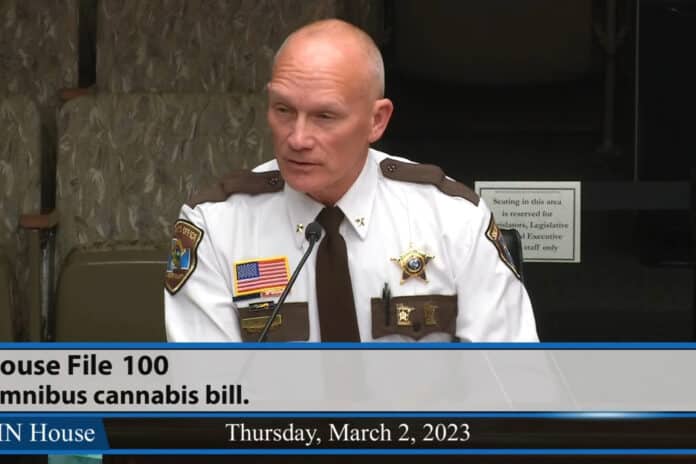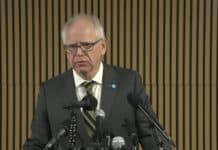
While recreational cannabis use has been legal in Minnesota for just more than one month, elected officials in local governments across the state are still sorting out just what that means for their communities.
Under the new law, you can’t yet buy or sell the product. You can grow it at your home in limited quantities and give some of that away to others. But many local government officials are having public conversations about where you can smoke it and how many businesses should eventually be allowed to sell it within a jurisdiction. At times, these conversations involve interpretation of potential conflicts between the new state law and federal regulations that still define marijuana as a controlled substance.
One sheriff in southern Minnesota’s most populous county has indicated this week he intends to follow federal law when issuing gun permits as it relates to prior marijuana convictions.
“Now a sheriff has a choice: Do I violate a federal law or a state law?” Olmsted County Sheriff Kevin Torgerson told county commissioners during a Sept. 5 board meeting.
Olmsted County staff are in the middle of gathering information about the new recreational marijuana law — which went into effect Aug. 1 — and shared some of their findings with county commissioners this week.
During the Tuesday meeting, Sheriff Torgerson told commissioners he plans to follow the federal law when evaluating gun permit applications that come to his office from individuals with prior marijuana convictions. Federal law bars those convicted of marijuana-related crimes within the past year from owning firearms.
“At this point, my direction to our staff is that I’d rather violate state law than federal law,” Torgerson said. “If I’m going to get arrested, I’m going to get arrested by the attorney general.”
Torgerson, who’s in the middle of his third term as the county’s top elected law enforcement official (he was unopposed in his 2022 re-election bid), has been vocal about his concerns over the new recreational marijuana law.
During testimony on HF100 at the state capitol in March, the sheriff told legislators the bill, as written, didn’t provide patrol officers with enough tools to keep cannabis-intoxicated drivers off the road.
“For nearly 20 years, the number of fatalities on (Minnesota) roads has been reduced nearly in half,” Torgerson said. “When other states legalize marijuana, the number of traffic fatalities has increased where one or more drivers are marijuana impaired. I’m saddened that the increased loss of life on our roads is just simply collateral damage for those who wish to put a foreign substance in their body.”
One of several other controversial provisions included in the sweeping bill the legislature passed this spring creates a new Cannabis Expungement Board that will be charged with processing prior low-level marijuana-related convictions for expungement. But state officials have said they don’t expect that process to be complete for at least another year.
The new law indicates that prior low-level marijuana-related criminal convictions will be expunged and that those who have had such convictions expunged would not have that prior conviction factor into an application for a gun permit.
Despite that, in an interview with ABC 6 News in Rochester this week, Torgerson said those who apply for a gun permit in Olmsted County will probably be denied, regardless of the new state law, if they have a recent marijuana-related conviction.
“For whatever reason, if they have been arrested for something and marijuana was part of that arrest, why should I issue that permit?” Torgerson said. “(The state law is) telling us we shouldn’t consider that. But that’s a contradiction to me. And I think the bulk of our public is going to understand that.”
On a related note, in May the federal Bureau of Alcohol, Tobacco and Firearms issued a clarification over how it will interpret Minnesota’s new recreational marijuana law as it relates to whether people using cannabis can possess a firearm.
“Until marijuana is legalized federally, firearms owners and possessors should be mindful that it remains federally illegal to mix marijuana with firearms and ammunition,” said ATF’s Acting Special Agent in Charge Jeff Reed of the St. Paul Field Division.
While that clarification specifically points out federal law prohibiting possession of a firearm while a current marijuana user, a U.S. Appeals Court opinion last month ruled that laws declaring an individual an “unlawful user” based on past drug use history are unconstitutional under certain circumstances.
“In short, our history and tradition may support some limits on an intoxicated person’s right to carry a weapon, but it does not justify disarming a sober citizen based exclusively on his past drug usage,” wrote U.S. 5th Circuit Judge Jerry Smith in the opinion issued Aug. 9.
Hank Long
Hank Long is a journalism and communications professional whose writing career includes coverage of the Minnesota legislature, city and county governments and the commercial real estate industry. Hank received his undergraduate degree at the University of Minnesota, where he studied journalism, and his law degree at the University of St. Thomas. The Minnesota native lives in the Twin Cities with his wife and four children. His dream is to be around when the Vikings win the Super Bowl.











